# Node.js基础
官网:https://nodejs.org/en/
官方文档:https://nodejs.org/en/docs/guides/
# Node.js 是什么
- Node.js is a JS runtime built on Chrome's V8 JS engine (Node.js是一个基于Chrome V8引擎的JS运行时)
- Node.js是一个异步的事件驱动的JS运行时
什么叫运行时,用类比的方法学习这个概念,一般语言都会提供一个运行时环境,Node.js其实就是提供js运行时的环境。
- JRE java运行时环境
- C Runtime
- .NET Common Language Runtime
runtime(运行时)指的是程序运行的时候,即指令加载到内存并由CPU执行的时候。运行时库就是程序运行的时候所依赖的库。
JS是解释型语言,还有一些语言执行之前是要编译的,比如C,Java等
C代码编译成可执行文件的时候,指令没有被CPU执行,这个时候算是编译时,也就是编译的时候。
# Node.js历史 - 为性能而生
Ryan Dahl /'raiən da:l/ 是nodejs的作者,他的工作是用C/C++写高性能web服务,对于高性能,异步IO、事件驱动是基本原则,但用C/C++写就太痛苦了。于是他设想使用另一种高级语言开发Web服务,评估了很多语言,发现很多语言虽然同是提供了异步IO和同步IO,但开发人员一旦使用了同步IO,他们就再也懒得写异步IO了,所以最终Ryan选择了JS。
因为JS是单线程执行,根本不能进行同步IO操作,所以JS的这一"缺陷"导致了它只能使用异步IO。
选定开发语言后,还要有运行时引擎。Ryan曾考虑自己写一个,不过明智的放弃了,因为V8就是开源的JS引擎,让Google投资去优化V8,而他只拿来用,还不用付钱。于是2009年,Ryan正式推出了基于JS和V8引擎的开源Web服务项目,命名为Node。Node第一次把JS带入到后端服务器开发,加上JS开发人员众多,Node一下子就火了起来。
# Node.js依赖(Dependencied)
https://nodejs.org/en/docs/meta/topics/dependencies/
Node.js功能依赖一些库和工具:
# Libraries
- V8 (opens new window) 由google维护的JS运行时引擎。V8为Node.js提供了JS引擎,Node.js通过V8 C++ API对其进行控制。
- libuv (opens new window) 另一个重要的依赖是libuv, 它一个C语言库,用于将非阻塞(异步)IO操作封装为受支持平台之间一致的接口。他提供了处理file system、DNS、netwrok、child process(子进程),pipes(管道),信号处理(signal handling),polling(轮询) and streaming(流传输)的机制. 它还包括了一个线程池(thread pool),用于分担某些无法在操作系统级别异步完成的工作。
libuv is a multi-platform support library with a focus on asynchronous I/O. It was primarily developed for use by Node.js
- llhttp (opens new window) Node.js HTTP parsing(解析)是通过llhttp来处理,一个轻量级的TypeScript和C库。他的设计宗旨是不进行任何系统调用(syscalls)或分配(allocations),因此每个请求的内存占用非常小。
- Node.js v12中内核的HTTP Parser默认使用了llhttp,取代了老旧的http-parser,性能提升了156%,参考: llhttp是如何使Node.js性能翻倍的? - 知乎 (opens new window)
- http-parser参考:https://github.com/nodejs/http-parser
- c-ares (opens new window) 对于某些异步DNS请求,Node.js使用了c-ares来处理。它是一个C库,It is exposed through the DNS module in JavaScript as the resolve() family of functions.
- OpenSSL (opens new window) tls和crypto模块中都广泛使用了OpenSSL,它提供了许多经过考验的加密功能实现,web依赖这些功能来保证安全性
- zlib (opens new window) 为了进行快速压缩何解压缩,Node.js依赖于行业标准的zlib库,该库因在gzip何libpng中的使用而闻名。Node.js使用zlib创建同步、异步及流式压缩何解压缩接口。
# Tools
- npm node package manager, 是Node.js的模块管理器,Node.js is all about modularity,and with that comes the need for a quality package manager; for this purpose, npm was made. With npm comes the largest selection of community-created packages of any programming ecosystem, which makes building Node.js app quick and easy.
- gyp build系统由gyp处理,它是从V8复制的基于python的项目生成器。可以生成用于跨多个平台的构建系统的项目文件。Node.js需要构建系统,因为它的大部分(及其依赖项)使用需要编译的语言写的。
- gtest 可以使用来自Chromium的gtest测试native code,It allows testing C/C++ without needing an existing node executable to bootstrap from.
# Node.js特性(JS特性)
# 并发处理
- 多进程 LinuxC、Apache
- 多线程 Java
- 异步I/O JS 事件回调方式
- 协程 - lua openresty、go、deno、TypeScript
ry(Ryan Dahl) 也就是node的作者, 2018年开启了一个新项目deno (opens new window), A secure JavaScript/TypeScript runtime built with V8, Rust, and Tokio , TypeScript还是非学不可的。
- justjavac对deno的分析介绍,参考 Deno 并不是下一代 Node.js (opens new window)
- Ryan Dahl:Node 设计失误值得反思,Deno 将汲取经验 (opens new window)
# 与前端的不同
- JS核心语法不变
- 前端:BOM DOM
- 后端:fs、http、buffer(缓冲区,二进制内容)、event、os
# Node API
# 第一个node程序
新建一个0_run.js文件,打印hello world,然后在终端(Terminal)用node命令执行:node 0_run.js
// 0_run.js, node 0_run.js终端会打印hello world
console.log('hello world');
# nodemon
上面的例子中,每次修改0_run.js后,想再次运行都需要再次执行node 0_run.js,调试时非常麻烦,这就需要用到nodemon了。
nodemon (opens new window) 监听node.js应用的所有改动,当改动发生时,自动重启服务(Monitor for any changes in your node.js application and automatically restart the server - perfect for development)
# 全局安装 nodemon 命令
npm install -g nodemon
# 执行,当0_run.js里的文件有更改时,会自动重启执行新的文件
nodemon 0_run.js
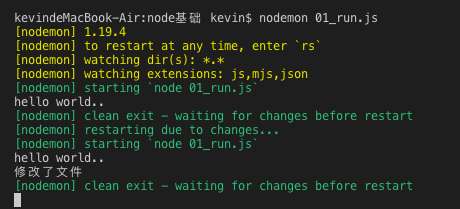
# 常用模块
# 核心模块(require都不需要就能直接使用)
- global
- buffer (opens new window) 用于处理二进制数据流
- alloc
- from
- write
- concat
- toString
- process
- module 模块操作CommonJS规范,require与module.exports
# 内置模块(不需要npm install安装,直接require就能使用)
- os
// http://nodejs.cn/api/os.html#os_os_freemem
// os.freemem() 方法以整数的形式回空闲系统内存的字节数(B)。
// os.totalmem() 方法以整数的形式返回所有系统内存的字节数(B)。
const os = require('os')
console.log('闲置内存:', os.freemem() / (1000*1000) + 'M')
console.log('总内存:', os.totalmem() / (1000*1000) + 'M' )
console.log(os.type()) // Darwin
console.log(os.release()) // 18.7.0 操作系统发行版本
console.log(os.hostname()) // kevindeMacBook-Air.local
console.log(os.homedir()) // /Users/kevin
console.log(os.cpus()) // 打印cpu内核信息,包括cpu具体型号
console.log(os.userInfo()) // 当前用户信息
- fs
- path
- http
- event
- util
# 第三方模块(需要npm install安装,需要require)
- download-git-repo (opens new window),Download and extract a git repository (GitHub, GitLab, Bitbucket) from node.
// 先安装 npm install download-git-repo --save
// 如果没有package.json 需要先npm init
/**
* @description Download a git repository to a destination folder with options, and callback.
* @params { String } repository
* - Github: github:owner/name 或者简写 owner/name
* - GitLab: gitlab:owner/name
* - Bitbucket : bitbucket:owner/name
* - 默认为主分支(master),指定分支 owner/name#my-branch
* @params { String } distination 下载repository后,存放的路径
* @options { Object } 可选的选项对象,download时的选项
* - { clone: false } 如果clone为true,将用git clone 代替http download
* = proxy, headers, filter 等
* @params { Function } callback 执行完成后的回调函数 function(err)
*/
download(repository, destination, options, callback)
// 实例:将github用户zuoxiaobai的todo项目,下载到test目录(可以是不存在的,会自动创建)下, 如果成功,打印OK,否则打印错误
// 使用第三方模块 download-git-repo
const download = require('download-git-repo')
download('github:zuoxiaobai/todo', 'test', err => {
console.log(err ? err : 'OK')
})
- ora (opens new window) Elegant terminal spinner 优雅的终端提示工具
// 上面的例子中,下载过程没有提示,可以使用ora这个模块,来加入提示信息
// 先来看看ora的demo 03—_ora.js
const ora = require('ora');
const spinner = ora('Loading unicorns').start();
setTimeout(() => {
spinner.color = 'yellow';
spinner.text = 'Loading rainbows';
}, 1000);
setTimeout(()=> {
spinner.warn('这是一个警告....')
}, 3000)
setTimeout(()=> {
spinner.fail('这是一个错误....')
}, 4000)
setTimeout(()=> {
spinner.succeed('加载成功!')
}, 5000)

优化后的下载代码
// 优化,加入下载过程中的提示
const download = require('download-git-repo')
const repo = 'github:zuoxiaobai/todo'
const dest = 'test'
const ora = require('ora')
const process = ora(`正在下载 ${repo} 到 ${dest} 目录...`).start()
download(repo, dest, err => {
console.log(err ? err : 'OK')
if (err) {
process.fail(err)
} else {
process.succeed('下载成功')
}
})

# 异步流程控制
- callback
taskone('任务1', () => {
// 任务1的回调
tasktwo('任务2', () => {
// 任务2的回调
taskThree('任务3', () => {
// 任务3的回调
console.log('task 3 callback')
})
})
})
如何让异步任务串行化
- promise then 承诺执行
function promise(name, delay = 1000) {
return new Promise(resolve => {
setTimeout(() => {
resolve()
console.log('异步任务' + name)
}, delay)
})
}
promise('异步任务1')
.then(() => {
promise('异步任务2')
})
.then(() => {
promise('异步任务3')
})
- ES6 generator
// Generator 和 yield 、 iterator
const generator = function* (name) {
yield promise(name);
yield promise(name)
}
const gen = generator('Generator')
gen.next().value.then( ()=> {
gen.next()
})
// 用next() 手动执行
- 自己实现一个co库
// 使用co模块,自动执行generator
let co = function(gen, name) {
var it = gen(name);
var ret = it.next();
ret.value.then((res) => {
it.next(res)
})
}
co(generator, 'CO')
- ES7 async/await
async () => {
await promise('异步任务1')
await promise('异步任务2')
}
# 使用内置模块util的promisify
util.promisify是在node.js 8.x版本中新增的一个工具,用于将老式的Error first callback转换为Promise对象,让老项目改造变得更为轻松。
// promisify 将函数转换为promise
// const { promisify } = require('util');
// 再次优化 内置util模块promisify
async function downloadRepo(repo, dest) {
const { promisify } = require('util')
const download = promisify(require('download-git-repo'))
const ora = require('ora')
const process = ora(`正在下载 ${repo} 到 ${dest} 目录...`).start()
try {
await download(repo, dest) // 下载
} catch(e) {
process.fail('失败')
}
process.succeed('下载成功!')
}
const repo = 'github:zuoxiaobai/todo'
const dest = 'test'
downloadRepo(repo, dest)
将download的代码封装为模块,再使用
// 04_download.js
module.exports.downloadRepo = async function (repo, dest) {
const { promisify } = require('util')
const download = promisify(require('download-git-repo'))
const ora = require('ora')
const process = ora(`正在下载 ${repo} 到 ${dest} 目录...`).start()
try {
await download(repo, dest) // 下载
} catch(e) {
process.fail('失败')
}
process.succeed('下载成功!')
}
// 02_useModule.js
// 封装为模块后,再次调用
const repo = 'github:zuoxiaobai/todo'
const dest = 'test'
let { downloadRepo } = require('./04_download')
downloadRepo(repo, dest)
# fs模块
const fs = require('fs')
// 1. 同步调用
const data = fs.readFileSync('./04_download.js')
console.log(data)
// data内容打印如下,为Buffer对象,读取的是二进制数据
// <Buffer 0a 6d 6f 64 75 6c 65 2e 65 78 70 6f 72 74 73 2e 64 6f 77 6e 6c 6f
// 61 64 52 65 70 6f 20 3d 20 61 73 79 6e 63 20 66 75
// 6e 63 74 69 6f 6e 20 28 72 65 70 ... >
console.log(data.toString()) // 将Buffer转换为字符串
// 打印内容如下:
//
// module.exports.downloadRepo = async function (repo, dest) {
// const { promisify } = require('util')
// const download = promisify(require('download-git-repo'))
// const ora = require('ora')
// const process = ora(`正在下载 ${repo} 到 ${dest} 目录...`).start()
// try {
// await download(repo, dest) // 下载
// } catch(e) {
// process.fail('失败')
// }
// process.succeed('下载成功!')
// }
// 2. 异步调用
fs.readFile('./04_download.js', (err, data) => {
if (err) throw err
console.log(data)
})
// 3. promisify处理异步调用
async function consoleFileData(filePath) {
let { promisify } = require('util')
let readFile = promisify(fs.readFile)
try {
let data = await readFile(filePath)
console.log(data)
} catch(e) {
throw err
}
}
consoleFileData('./04_download.js')
# Buffer对象
操作二进制值,需要使用Buffer
const buf1 = Buffer.alloc(10) // 分配一个10字节空间
console.log(buf1)
// 10个字节
// <Buffer 00 00 00 00 00 00 00 00 00 00> // 用16进制,表示二进制数
// 00 16进制数,代表一个字节
const buf2 = Buffer.from('a') // 将字母a,转换为二进制数据
console.log(buf2, buf2.toString()) // <Buffer 61> 'a'
const buf3 = Buffer.from('中文')
console.log(buf3) // <Buffer e4 b8 ad e6 96 87>
// 拼接两个buffer
const buf4 = Buffer.concat([buf2, buf3])
console.log(buf4, buf4.toString())
// <Buffer 61 e4 b8 ad e6 96 87> 'a中文'
# http模块
# 开启一个http服务
// 07_http.js
const http = require('http')
const server = http.createServer((req, res)=> {
res.end('hello....')
})
server.listen(3003)
// node 07_http.js 然后打开浏览器,访问127.0.0.1:3003 即可看到hello...

# 渲染静态页面或json数据
// 利用fs,渲染静态html、JSON字符串返回
const http = require('http')
const fs = require('fs')
const server = http.createServer((req, res)=> {
const { url, method } = req
console.log('url, method: ', url, method)
if (url === '/' && method === 'GET') {
fs.readFile('index.html', (err, data) => {
if (err) throw err
res.statusCode = 200
res.setHeader('Content-Type', 'text/html')
res.end(data)
})
} else if (url === '/users' && method === 'GET') {
res.writeHead(200, {
'Content-Type': 'application/json'
})
res.end(JSON.stringify({
name: 'guoqzuo'
}))
}
})
server.listen(3003)
# stream 流
现有图片img.png,复制一份该图片,使用流
// 复制一个图片,就需要使用stream 流了。
const fs = require('fs')
const rs = fs.createReadStream('./img.png')
const ws = fs.createWriteStream('./img2.png')
rs.pipe(ws)

使用流
// 07_http.js代码片段
// ...
const { url, method,headers } = req
// ...
else if (method === 'GET' && headers.accept.includes('image/*')) {
// 使用流
// 如果index.html有img,或是请求 /favicon.ico 时,可以正常加载图片
fs.createReadStream('./' + url).pipe(res)
}
// ...
# 工具链
写一个npm包zuo-util
# 创建一个目录
mkdir zuo-util
cd zuo-util
npm init # 生成package.json
# 创建可执行的命令
# 什么是可执行的命令?
以vue这个命令为例,对于新手来说会很困惑。vue命令并不是vue的命令。而是vue-cli这个node包全局安装时注入的。当运行 npm install -g vue-cli 时,会全局安装vue-cli,然后在terminal终端就可以直接运行vue命令。而是vue -V 显示vue-cli版本是3.5.5,而不是vue的版本,毕竟现在vue还没有3.0的版本
# 为zuo-util 创建一个可执行命令zuo
mkdir bin; cd bin;
touch zuo // 在bin目录下创建文件zuo,注意不要加后缀
在zuo这个文件里,写入下面的内容, 最开始的一行是文件头,表示这是一个node程序,用node写的shell。
#!/usr/bin/env node
console.log('this is zuo util')
然后在package.json里加入下面的代码,指定命令的目录
"bin": {
"zuo": "./bin/zuo"
},
# 运行命令 zuo
如果想要命令全局运行,需要在zuo-util目录下执行npm link命令,这样就可以在终端运行zuo这个命令了
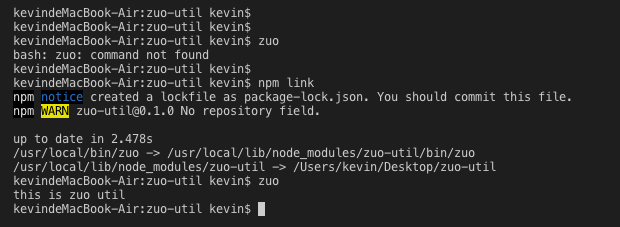
# 使用commander模块显示帮助文档
commander模块是一个命令行工具,一般用于terminal提示,命令解析
修改 /bin/zuo内容如下:
#!/usr/bin/env node
const program = require('commander')
program.version(require('../package.json').version)
.command('init <name>', 'init project')
.command('cpu','show os cpu info')
program.parse(process.argv);
上面使用commander模块,初始化了一个提示,当直接执行zuo命令,会显示帮助信息,version指定zuo -V后打印额值,command显示具体的命令及说明。zuo init 会执行/bin/zuo-init,zuo cpu 会执行 /bin/zuo-cpu
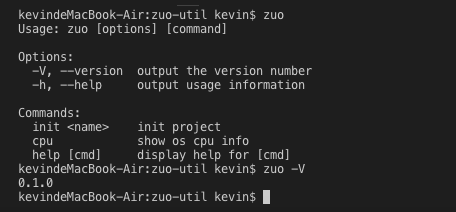
如果直接执行zuo cpu 会提示文件没有可执行权限
kevindeMacBook-Air:zuo-util kevin$ zuo cpu
error: /Users/kevin/Desktop/zuo-util/bin/zuo-cpu(1) not executable. try chmod or run with root
# 需要在terminal 里处理下权限,方法文档 man chmod
chmod +x bin/* # 将bin文件下的所有文件添加可执行权限
上面说了zuo init会执行/bin/zuo-init方法,为什么?我们来看看progress.argv,下面是/bin/zuo-init的代码,跑起来看看process.argv到底是什么
#!/usr/bin/env node
console.log('zuo init')
console.log(process.argv)

所有可以理解为zuo init test,实际执行的是
/usr/local/bin/node /Users/kevin/Desktop/zuo-util/bin/zuo-init test
# 相当于 node zuo-init test
# 初步实现两个命令
这里实现zuo init 和 zuo cpu两个命令
/bin/zuo-cpu
#!/usr/bin/env node
const os = require('os')
let cpuInfoArr = os.cpus()
console.log('CPU INFO: ')
console.log(' - Count: ' + cpuInfoArr.length)
console.log(' - Model: ' + cpuInfoArr[0].model)
console.log(' - Speed: ' + cpuInfoArr[0].speed)
/bin/zuo-init
#!/usr/bin/env node
console.log('zuo init')
console.log(process.argv)
if (process.argv.length < 3) {
console.log('Arguments error, Please use like: zuo init <name>')
} else {
console.log('TODO Init project ' + process.argv[2])
}
# 上传npm
在 zuo-util目录创建publish.sh脚本文件,为该文件添加可执行权限 chmod +x publish.sh; 执行 ./publish.sh
#!/usr/bin/env bash
npm config get registry # 检查仓库镜像库
npm config set registry=http://registry.npmjs.org
echo '请进行登录相关操作:'
npm login # 登陆
echo "-------publishing-------"
npm publish # 发布
npm config set registry=https://registry.npm.taobao.org # 设置为淘宝镜像
echo "发布完成"
exit
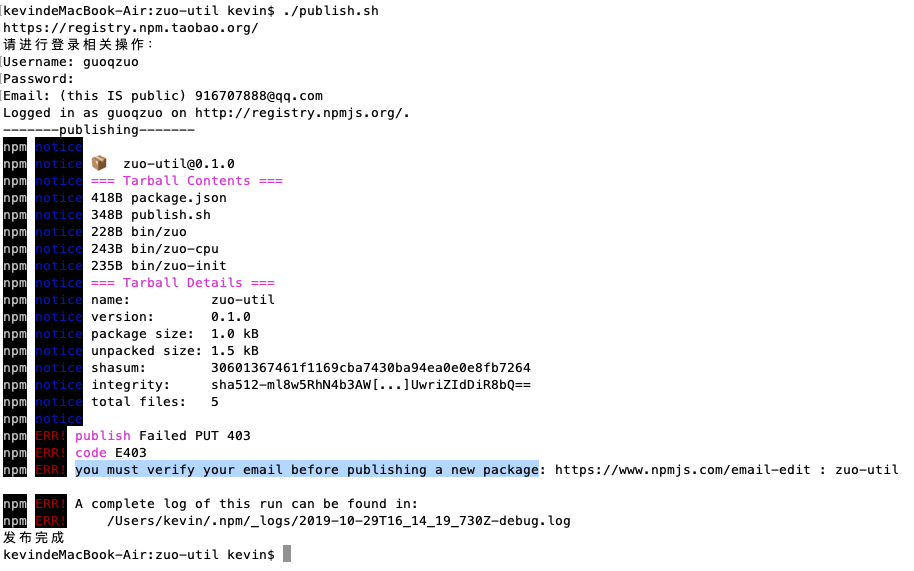
由于是第一次提交,需要先运行 npm adduser 否则会出现错误
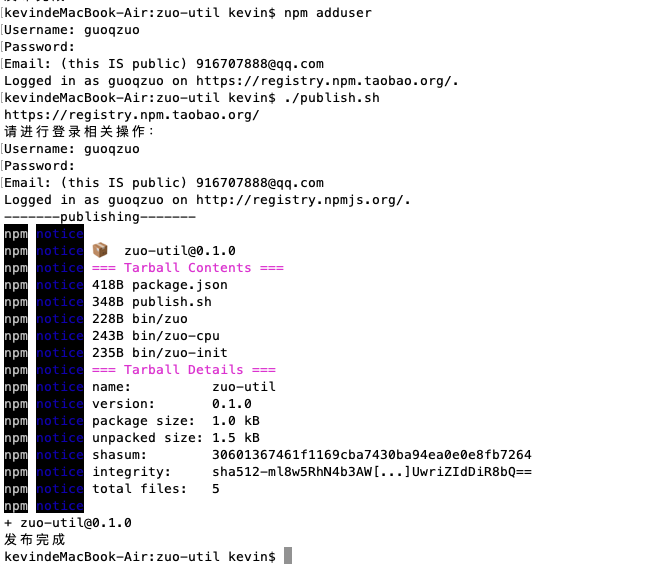
# 版本更新
比如添加了README.md文档,需要从 0.1.0 升级到 0.1.1
- 修改package.json里的version为 0.1.1
- 运行 ./publish.sh,提交新版本
# 其他问题
- Packages and modules (opens new window) 官方文档精读
- 关于版本更新记录,可以学axios放到CHANGELOG.md里
- 研究入口index.js,可以导出一些模块
- index.d.ts TypeScript支持
- LICENSE 添加
- 想设置发布文件的黑名单,通过.gitignore或.npmignore这两个文件来设置忽略的文件或文件夹。参见 NPM发包建议 (opens new window)
- commander 模块后续深入了解
- handlebars (opens new window) 文件渲染模板模块研究
- npm version 研究,参考 NPM包(模块)发布、更新、撤销发布 (opens new window)
- 在node_modules 里仔细研究 axios,commander等模块源码
← Node.js 第三方模块笔记 Koa →